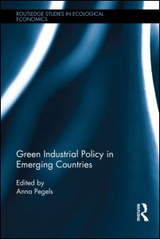The politics of South African renewable energy support
Pegels, Anna
Externe Publikationen
(2014)
in: Anna Pegels, Green industrial policy in emerging countries, London: Routledge, 126-147
ISBN: 978-0-415-87067-2
Information
In her chapter ‘The politics of South African renewable energy support’ Anna Pegels analyses the measures taken by the South African government since 2009 to deploy renewable energies in the country. The South African energy regulator introduced fixed renewable energy feed-in tariff (FIT) rates in 2009. However, considering the rates to be too high, other government agencies opposed the scheme. The rates were indeed quite attractive and, in combination with the plummeting cost of solar PV equipment in particular, would have led to considerable rents for renewable energy project developers. However, a two-year implementation stalemate ended when the fixed FIT rates were replaced with a competitive bidding procedure. While this procedure has been lauded for its professionalism, considerable uncertainty arose during the conversion phase, and a more systematic approach to policy-learning would have been desirable. However, the newly introduced bidding system seems to be very successful in curbing excessive profits. Compared to the initial FIT, tariff rates have fallen sharply, which has also helped to take the edge off the opposition from South Africa’s energy-intensive and powerful industry. It has, moreover, limited the need to raise electricity prices to consumers, who have already faced several price hikes in recent years. There is little willingness to pay for renewable energy deployment, since such issues as poverty reduction, job creation and infrastructure provision clearly take precedence over environmental protection in South African voters’ preferences. A competitive process for renewable energy support, recognized as likely to prevent excessive profits, is more acceptable under these conditions than a feed-in tariff without competitive determination of support rates. The additional combination of the support scheme and local content requirements (LCRs) in South Africa underlines the job creation potential and helps to make the scheme politically acceptable.
Weitere IDOS-Expert*innen zu diesem Thema
-
Aleksandrova, Mariya
Climate risk governance
-
Altenburg, Tilman
Wirtschaftsgeographie
-
Asimeng, Emmanuel Theodore
Stadtplanung, Nachhaltigkeit
-
Brandi, Clara
Ökonomie und Politikwissenschaft
-
Dippel, Beatrice
Komparatistik
-
Donnelly, Aiveen
Politikwissenschaft
-
Ekoh, Susan S.
Umweltwissenschaft
-
El-Haddad, Amirah
Ökonomie
-
Fuhrmann-Riebel, Hanna
Ökonomie
-
Goedeking, Nicholas
Vergleichende politische Ökonomie
-
Hagenström, Paul
Internationale Beziehungen
-
Kativu, Saymore Ngonidzashe
Geographie
-
Lehmann, Ina
Politikwissenschaft
-
Loewe, Markus
Ökonomie
-
Malerba, Daniele
Ökonomie
-
Mathis, Okka Lou
Politikwissenschaftlerin
-
Never, Babette
Politikwissenschaftlerin
-
Rodríguez de Francisco, Jean Carlo
Ökologische Ökonomie
-
Sommer, Christoph
Ökonom
-
Sowa, Alina
Ökonomie
-
Srigiri, Srinivasa Reddy
Agrarökonom
-
Strohmaier, Rita
Wirtschaftswissenschaften
-
Stöcker, Alexander
Ökonomie
-
Vogel, Tim
Ökonomie
-
Vrolijk, Kasper
Ökonomie
-
Wagner, Niklas
Klima- und Wissenssoziologie
-
Yi, HyunAh
Energie- und Umweltwissenschaften
-
Zintl, Tina
Politikwissenschaftlerin


